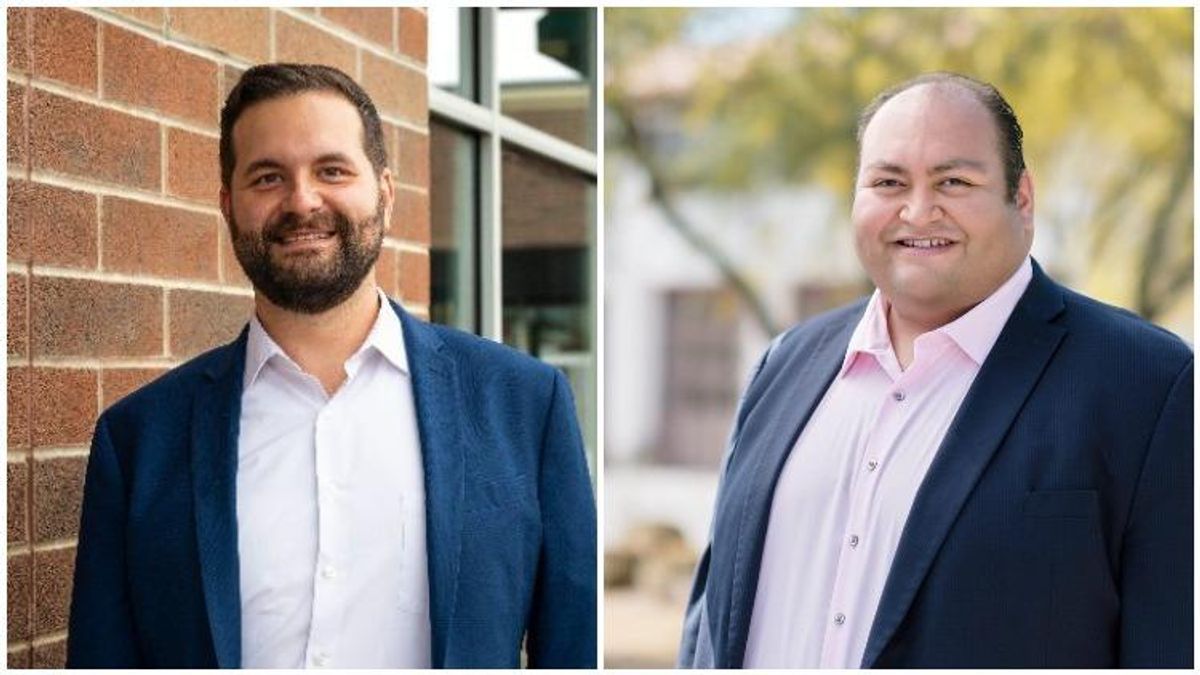Purple is a color often associated with the LGBTQ+ community -- and it turns out purple districts are often friendly places for out political candidates.
Almost half the out members of the U.S. House of Representatives are from swing districts -- those not dominated by either Democrats or Republicans and are therefore competitive for both parties. The electoral victories of these politicians should allay fears that LGBTQ+ candidates can be elected only from deep blue areas -- that is, heavily Democratic ones, according to a new analysis by Third Way, a think tank that champions center-left ideas.
"In 2022 and beyond, those who want to win should not hesitate to recruit LGBTQ candidates to build their majorities in purple places," says Third Way's study, "The 'Electability' of LGBTQ Candidates."
Third Way points to the success of four out House members from swing districts: Angie Craig of Minnesota's Second District, Sharice Davids of Kansas's Third District, Sean Patrick Maloney of New York's 18th District, and Chris Pappas of New Hampshire's First District. Maloney is in his fifth term, the others in their second. They're among nine out House members overall (all Democrats), the others being from reliably blue districts, but now more purple-district candidates are seeking to join them.
Among them are Sean Meloy in Pennsylvania's 17th District, encompassing suburban and rural areas adjacent to Pittsburgh, and Daniel Hernandez in Arizona's Tucson-area Sixth District (formerly the Second District, now redrawn, renumbered, and with a larger proportion of Republicans than before). Both are gay Democrats running for open seats. Meloy is seeking to replace Conor Lamb, who's leaving the House to run for U.S. Senate, and Hernandez is aiming to succeed Ann Kirkpatrick, who's retiring. The seat was once held by Gabrielle Giffords; Hernandez interned for Giffords and famously helped save her life when a gunman opened fire at a 2011 event in Tucson where she was meeting constituents.
Meloy and Hernandez offer different but complementary reasons for the appeal of out candidates in swing districts. Meloy says LGBTQ+ candidates have earned voters' trust through honesty. "We've been honest about the most difficult thing we've had to be honest about," he says.
Hernandez cites the ability to work across differences. "One of the things that's really important is building coalitions," he says. "We are the natural bridge-builders and the natural coalition-makers." He points to his record of working with Republicans in the Arizona House, where he's served since 2017, to pass legislation protecting survivors of sexual assault and to fund school resource officers and social workers.
The Third Way study also notes that LGBTQ+ candidates who bring relatability to their races have an asset: Those who've won in swing districts "were candidates to whom people could relate," the study states. "They shop at their local grocery store, watch their children's soccer games, go to school talent shows, and work to pay their mortgage."
Both Meloy and Hernandez have a long history with their districts -- they're natives of the areas where they're running. They bring extensive experience to their races as well. This is Meloy's first run for office, but he's a longtime political organizer, having served as director of LGBTQ engagement for the Democratic National Committee and vice president at the LGBTQ Victory Fund, which works to elect out candidates and saw the number of out officials nationwide double during his tenure. Victory Fund has endorsed both Meloy and Hernandez. The latter, before being elected to the Arizona House, was a member of his local school board for five years, so he has a total of 11 years in elected office.
Meloy would be the first out member of Congress from Pennsylvania, although there's a possibility he could share that distinction with Malcolm Kenyatta, the state representative who's among the candidates vying with Lamb for the Senate nomination. Hernandez would be the second from Arizona -- Kyrsten Sinema, who is bisexual, was in the U.S House for three terms and is now an often-controversial U.S. senator.
Both men are obviously passionate about LGBTQ+ equality, but they also emphasize what are sometimes called "kitchen table" issues -- the economic concerns of the middle and working classes, such as access to health care and child care. Each cites several other priorities as well, including voting rights and campaign finance reform.
Meloy says he was motivated to run by the shock he felt at the insurrection at the U.S. Capitol on January 6, 2021, when extremist supporters of Donald Trump tried to stop the certification of the electoral vote for Joe Biden. Additionally, he says, "I just saw intransigence and lack of progress on so many important things," and he wants to change that.
Hernandez adds, "The reality is, voters want results." On his reason for running for Congress, he says, "I've always been motivated by 'Where can I make the most impact?'" Having done that at the school district and state levels, he's ready to work on a national basis.
Both have to get through their party primaries, where they face several rivals -- Pennsylvania's primary is May 17, Arizona's August 2 -- and then, if they win their respective nominations, the November general election. But both exude confidence about the ability of out candidates to win swing districts, even if some political observers have doubts.
Meloy says most people in the LGBTQ+ community welcomed his entry into the 17th District race, but there were some who privately told him that supporting him was too risky. There's just one way to get rid of that attitude, he says: "The way to make sure we dispel that is by winning."

















































































